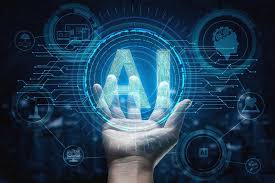![]()
– Oluwatoyosi Alarape
On a typical day, a student at fountain university, Amina Balogun, begins her morning by asking virtual assistants like ChatGPT, Meta AI, and Gemini for answers to her assignments, checking her personalized fitness app for her workout routine, and streaming AI-curated music playlists during her commute to class. “AI makes my life so much easier,” she says with a smile. But like many others, Amina is also cautious about its downsides. “Sometimes I wonder how much of my personal data these apps collect and what they do with it.”

Amina’s experience reflects a growing global phenomenon-the integration of Artificial Intelligence (AI) into everyday life.
In today’s world Artificial Intelligence has also become indispensable in shaping how people learn and interact with their environment. It is integrated into educational tools, healthcare advancements and even daily tasks like navigation and communication.
According to the National Bureau of Statistics (NBS), Nigeria has seen a 45% increase in AI adoption in the last five years, with industries like finance, healthcare, and agriculture leveraging these tools to improve efficiency.
Economically, AI is a double-edged sword. While it drives innovation and growth—contributing 18.44% to Nigeria’s GDP in 2024, according to the NBS.
AI’s presence in education has been nothing short of transformative. With platforms like Duolingo for language learning and Grammarly for writing assistance, AI has made learning more interactive, personalized, and accessible. In Nigeria, apps like Ulesson are playing a key role in offering customized tutoring sessions to students, providing an innovative approach to education in a country where access to traditional educational resources can sometimes be limited.
For many students, AI has become their academic companion. It helps with assignments, research, and time management. Virtual assistants like Siri, Alexa, and Google Assistant play a crucial role in organizing schedules, setting reminders, and even providing quick answers to academic queries. AI tools are used to streamline educational tasks, making the learning experience more efficient and less time-consuming.
Dunke, an accounting student, shares, “I unlock my smartphone with facial recognition, use virtual assistants like Siri or Google Assistant, and I also rely on AI for insights into my assignments. It helps me solve problems and complete calculations much faster.”

Fatimah, another student, uses AI primarily for scheduling and organizing her day. “AI suggests how I can organize my time, and after class, I use it to search for information, and help with my assignments. It feels like a partner that helps me solve difficult tasks and even motivates me,” she adds.

AI’s role in agriculture cannot be overstated. Farmers now use AI to predict weather patterns, monitor crop health, and optimize yields through data-driven insights. AI technologies have enabled precision farming, which involves the use of sensors, drones, and AI algorithms to monitor soil health, track pests, and even optimize irrigation. This allows for more sustainable farming practices, which are critical as the global population continues to rise.
One notable figure in this domain is Farmer Samson Ogbole, the Team Lead at Eupepsia Place Limited, also known as Soilless Farm Lab. His innovative approach integrates technology and AI to revolutionize farming practices in Nigeria.
At Soilless Farm Lab, Ogbole employs soilless cultivation methods, growing plants in the air and utilizing AI-based irrigation systems. These technologies enable precise plant monitoring, ensuring optimal yields and predictable food production. He emphasizes that agriculture should adopt a business mindset, incorporating technology, automation, precision, data analytics, and climate-smart practices. Ogbole is dedicated to building modern farms that explore the latest agricultural technologies and to mentoring young entrepreneurial farmers in adopting these modern techniques to foster national development.
Ogbole’s work exemplifies how AI and technology can transform traditional farming, making it more efficient and sustainable. His efforts in mentoring and training others aim to create a new generation of farmers equipped with the skills to implement modern agricultural practices, thereby contributing to food security and economic growth in Nigeria.

AI applications in agriculture have empowered farmers to increase productivity while minimizing resource wastage. AI’s predictive capabilities can also help farmers make timely decisions, which directly impact crop yields and ultimately, food security. This demonstrates AI’s growing importance in ensuring sustainable agriculture practices in countries that heavily depend on farming for economic growth.
Airtificial intelligence is also reshaping the healthcare industry, improving diagnostic accuracy and treatment planning. From early disease detection to personalized treatment options, AI has made significant strides in enhancing patient outcomes. AI is playing a vital role in healthcare by assisting doctors in diagnosing diseases faster and more accurately. AI algorithms are increasingly used in medical imaging to detect signs of diseases such as cancer, aiding doctors in making faster, more accurate diagnoses.
According to Mrs. Adegbore, the Head of the Department of Public Health at Fountain University, AI applications in healthcare are proving invaluable, particularly in low-resource settings like Nigeria, where access to medical professionals is often limited. She highlights that AI-powered diagnostic tools are helping to address the shortage of doctors by providing real-time analysis of medical images, assisting in early disease detection, and improving patient outcomes.
“For instance, AI-driven mobile applications are being used in rural clinics to diagnose malaria and tuberculosis by analyzing images of blood samples and chest X-rays. These tools, powered by machine learning algorithms, enable healthcare workers to make accurate diagnoses quickly, even in remote areas where specialists are unavailable,” she explains.
Additionally, AI-powered chatbots and telemedicine platforms are improving access to healthcare by offering preliminary consultations and guiding patients on the next steps for treatment. This innovation reduces hospital congestion and ensures that people in underserved regions receive timely medical advice.
The Dean College of Basic Medical and Health Sciences at Fountain University, Dr. Desola Adeoye, acknowledges the immense potential of AI in healthcare but also cautions about its challenges. “AI has the potential to revolutionize patient care by enhancing precision in diagnosis, streamlining administrative processes, and even assisting in robotic surgeries,” she notes. “However, its implementation comes with challenges, including data privacy concerns, high costs of AI systems, and the need for regulatory frameworks to ensure ethical use.”
She further points out that while AI can enhance healthcare efficiency, it should not replace human touch, especially in nursing care. “AI can support clinical decision-making, but healthcare is ultimately about empathy and human connection. Striking the right balance between technology and human interaction is crucial to ensuring AI benefits both healthcare professionals and patients.”
Despite its many advantages, AI presents significant challenges that need to be addressed to ensure its responsible integration into society.
As artificial intelligence (AI) continues to revolutionize various aspects of society, experts emphasize the need for responsible integration to mitigate its challenges. While AI offers numerous benefits, its future will largely depend on how society manages its capabilities and addresses potential risks.
Dr. Chukwuma Okeke, a technology expert, describes AI as a game-changer but warns of its challenges, particularly algorithmic bias. “AI systems are trained on vast datasets, and if these datasets contain biases or lack diversity, the outcomes produced by AI can be harmful,” he explains. “For instance, biased AI models in recruitment processes or law enforcement can lead to unfair discrimination. Addressing these ethical concerns is crucial to ensuring AI serves society equitably.”
He further stresses the importance of proactive measures to mitigate AI’s societal impact. “AI has transformative potential, but stakeholders including policymakers, developers, and researchers must work together to ensure its ethical and fair use,” he adds.
Similarly, Professor Abdul Jaleel Kehinde Shittu, an expert in Information and Communications Technology (ICT), emphasizes the need for responsible AI deployment. “AI is shaping our daily lives in profound ways, from healthcare to business automation. However, rather than focusing solely on its challenges, we should prioritize positive integration to maximize its benefits,” he says.
One of the critical concerns he highlights is data privacy. “AI-powered applications collect and store vast amounts of personal data, raising concerns about how this data is being used and whether users truly have control over their information. With AI models being trained on these datasets, there is an urgent need for transparency and stronger data protection measures,” he explains
Professor Shittu also points to job displacement as a pressing challenge. “AI is driving efficiency and innovation, but its rapid adoption threatens traditional jobs, especially in industries like manufacturing, clerical work, and customer service. As automation replaces tasks previously performed by humans, there must be a strategic focus on reskilling and upskilling workers to adapt to this evolving job market,” he advises.
According to Shittu, the key to harnessing AI’s full potential lies in collaboration. “Policymakers, academics, and industry leaders must work together to ensure AI enhances human life without compromising societal values. A balanced approach where AI complements rather than replaces human intelligence is necessary for sustainable development,” he concludes.
The integration of AI into daily life offers immense opportunities for innovation, efficiency, and progress. From healthcare to education, agriculture, and beyond, AI is playing a crucial role in improving lives, particularly in developing nations like Nigeria. However, for AI to fulfill its true potential, society must confront its challenges, including bias, privacy concerns, and job displacement.
The future of AI lies on responsible use, transparency, and ethical considerations. With informed decisions and collective efforts, society can ensure that AI becomes a force for empowerment, enhancing human life while safeguarding the values that make us human.

























